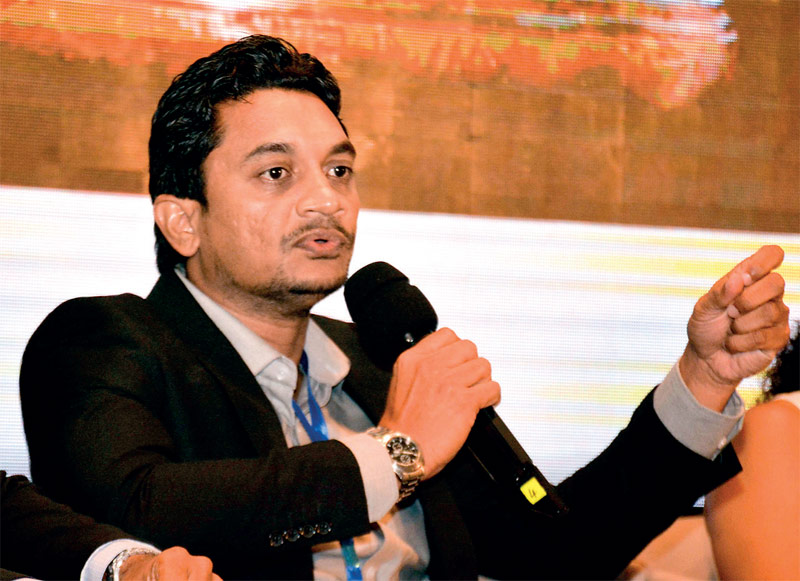Saturday Feb 21, 2026
Saturday Feb 21, 2026
Monday, 10 February 2025 02:18 - - {{hitsCtrl.values.hits}}

Industry and Entrepreneurship Development Deputy Minister Chathuranga Abeysinghe
By Charumini de Silva
Industry and Entrepreneurship Development Deputy Minister Chathuranga Abeysinghe stated that the Government is shifting its focus towards encouraging entrepreneurship and enhancing workforce skills to drive economic growth.
Speaking at the recently concluded Sri Lanka Economic Summit 2025, he outlined a strategic vision aimed at bridging skill gaps, enabling rural entrepreneurs and integrating local businesses into the global supply chain.
Abeysinghe highlighted a crucial distinction between ‘lifestyle businesses’ — small-scale ventures primarily for self-sustenance and ‘serial entrepreneurship’, which contributes significantly to economic expansion.
Citing available data, he said 90% of country’s entrepreneurs generate below Rs. 10 million annually, raising the question of whether they are ‘true business owners’ or simply ‘earning a living’.
“What we need is a model that does more than just encourage economic participation. The goal should be to create businesses in rural areas that are directly linked to high-value industries,” he said.
One such promising sector he outlined is boatbuilding, where Sri Lanka has demonstrated strong potential over the past few years. The Deputy Minister emphasised the need for a supply chain of skilled workers from rope makers to electrical engineers and painters to support the industry’s growth.
Given the country’s strategic location and expanding demand for maritime services, Abeysinghe believes that Sri Lanka can emerge as a key player in regional boat manufacturing and marine tourism.
The Deputy Minister underscored the need for businesses to integrate into global supply chains rather than merely competing within the domestic market. “Although the SMEs contribute significantly to the gross domestic production (GDP) growing at around 5% annually, most local businesses are engaged in internal competition rather than value-added exports,” he disclosed.
Looking ahead, the Deputy Minister said the Government is also focusing on long-term industrial planning, with a commitment to developing sector-specific strategic blueprints.
Abeysinghe asserted that within six months, each major industry should have a clear roadmap defining its growth trajectory, energy efficiency targets, workforce requirements and competitive positioning.
“We need clarity on where each industry is heading, what they aim to become — their short and long term goals and how the Government will support them,” he said.
He said this collaborative approach will ensure that both private sector and policymakers are aligned on economic priorities.
Abeysinghe pointed to industries such as coconut, rubber and agriculture, which offer vast untapped potential for value-added exports if businesses can scale effectively. “The Government is therefore prioritising knowledge-sharing, capacity building and better connectivity between rural SMEs and global markets,” he added.
He stressed access to finance and operational space is a major challenge for startups and SMEs. “Many entrepreneurs invest heavily in land and buildings before their businesses are fully established, leading to financial strain,” he said.Noting that the country lacks a comprehensive loan scheme for startups that do not own any assets, Deputy Minister revealed that the Government is working on a Development Bank initiative, bringing together major banks — People’s Bank, National Savings Bank (NSB) and Regional Development Bank (RDB) and others, to create a Rs. 50 billion SME funding pool. “This initiative will offer startups unsecured loans of Rs. 1 million, provided they meet certain financial discipline requirements such as proper accounting, feasibility studies and training completion,” he explained.
In addition, he disclosed a Credit Guarantee Scheme is in the works, where 70% of loan risks will be covered to encourage banks to lend to SMEs at lower interest rates.
According to him, another pressing issue is informality in the SME landscape, with 70-80% of businesses operating outside the formal economy—limiting their ability to access financing and global markets.
He said the Government is introducing incentives for formalisation, including a performance-based rating system that links business growth to better credit access and market opportunities.
“By offering clear advantages for businesses to register and follow structured development programs, the Government aims to incentivise SMEs to move from informal survival businesses to scalable enterprises,” he added.